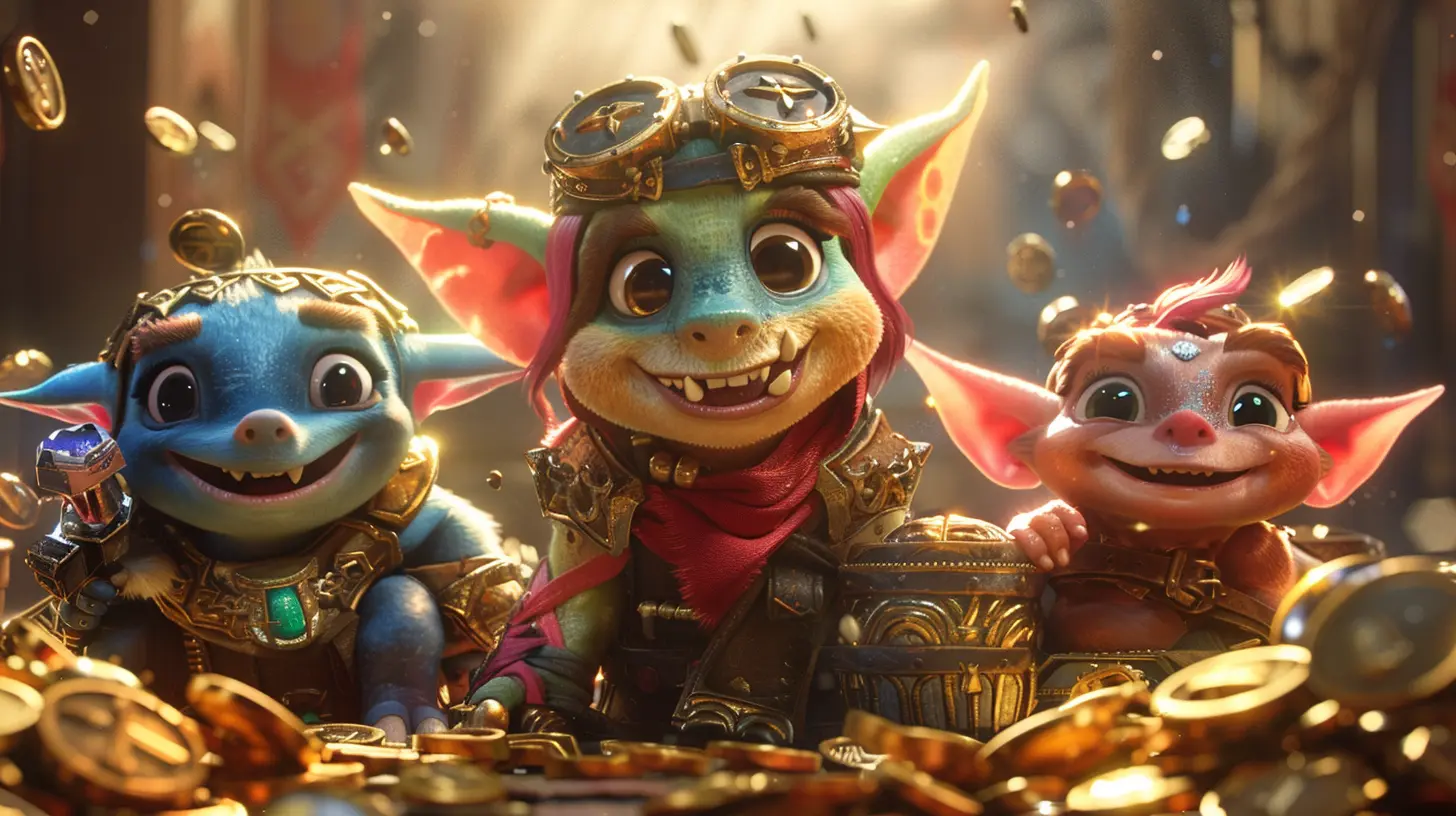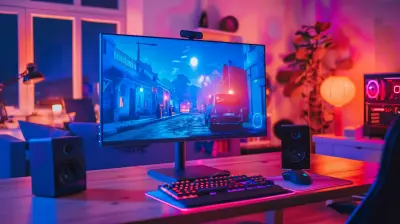The Ethics of Microtransactions: Are They Fair to Players?
20 April 2025
In recent years, video games have evolved from mere forms of entertainment into massive industries worth billions of dollars. And with this evolution, a new phenomenon has taken the stage: microtransactions. You’ve seen them before—those little prompts asking you to spend a few bucks for extra skins, in-game currency, or an XP boost. Harmless, right? Or are they a trap that’s slowly sucking the fun out of gaming? Let’s take a closer look at the ethics of microtransactions and ask the question we’ve all been wondering: are they really fair to players?
What Are Microtransactions, Anyway?
Before we dive into the debate, let’s make sure we’re all on the same page. Microtransactions are small, in-game purchases that allow players to buy virtual goods or upgrades. These can include:- Cosmetic items like costumes, weapon skins, or mounts.
- Pay-to-win advantages such as better weapons, faster progression, or powerful abilities.
- Gacha or loot boxes, where you pay for a chance to win rare items.
You’ll find microtransactions in everything from mobile apps to AAA console games. And although they might only cost a few dollars at a time, those little expenses can add up—big time.
But here’s the million-dollar (or should we say billion-dollar) question: are these microtransactions ethical, or are they exploiting players? Let’s dig into it.
The Good: Why Microtransactions Aren't All Bad
Let’s give credit where it’s due. Microtransactions aren’t inherently evil. In fact, they’ve actually got a few perks—when done right. Here’s why:They Keep Games Free (Or Affordable)
Let’s be real: not everyone can afford a $70 price tag for a brand-new game. Microtransactions allow developers to offer free-to-play or low-cost games and make their money back through optional purchases. Think about games like Fortnite or Genshin Impact. You can totally enjoy them without spending a dime—if you’ve got the patience.They Fund Ongoing Development
Ever wonder how some games keep pumping out new content, updates, and expansions years after launch? Microtransactions help pay for all that. Developers use this revenue to keep their games alive and kicking, ensuring players have stuff to do long after launch day.They Add Personalization
Who doesn’t love rocking a unique outfit or weapon skin that screams you? Microtransactions can help players express their personalities in the game. It’s like decorating your avatar or car in a way that sets you apart from the crowd.
The Bad: When Microtransactions Get Shady
Okay, now let’s flip the coin. Here’s where microtransactions start to feel like a raw deal for players.Pay-to-Win: The Ultimate Fun Killer
Is there anything more frustrating than grinding for hours to unlock a cool weapon, only to find out some other player bought it outright for $10? Pay-to-win schemes are the bane of many gamers’ existence. They create an uneven playing field where skill and effort matter less than how much cash you’re willing to drop.Games like Clash of Clans or FIFA have been heavily criticized for creating systems where the biggest spender often comes out on top—not the most skilled player. It’s like playing Monopoly with someone who can buy hotels before passing "Go."
The Addiction Factor
Here’s where things get seriously dicey. Some microtransactions, like loot boxes, tap into psychological tricks similar to gambling. You spend money for a chance to win rare loot. Sound familiar? That’s because it’s a lot like pulling the lever on a slot machine.Studies have shown that this randomness can be addictive, especially for younger players. Some even argue that certain microtransaction systems prey on players with gambling tendencies, making them spend way more than they intended.
Kids and Predatory Practices
Speaking of younger players, can we talk about how easy it is for kids to rack up huge bills on microtransactions? It’s not uncommon to hear horror stories of parents discovering that their child spent hundreds—sometimes thousands—of dollars on in-game purchases.Games marketed toward kids often blur the lines between virtual and real money, making it hard for young players to understand the consequences of their actions. That raises some serious ethical red flags, doesn’t it?
The Ugly: Corporate Greed and Player Frustration
Let’s address the elephant in the room: money. Game companies are businesses, and businesses exist to make profits. But at what point does profit come at the expense of player satisfaction?Artificial Grind Mechanics
Ever felt like a game forces you to spend money to avoid a grindfest? That’s no accident. Some developers design games with frustratingly slow progression systems, intentionally nudging players toward spending money just to save time and sanity.For example, mobile games often include energy systems that limit how much you can play at one time. Want to play more? Cough up some cash. It’s like going to an all-you-can-eat buffet, only to find out you’re charged extra for dessert.
Lack of Transparency
Then there’s the issue of transparency. With loot boxes, for example, players often have no idea what their odds are of winning rare items. Some governments have even classified these practices as gambling, forcing game companies to disclose the odds or ban the system entirely.If you’re spending real money, shouldn’t you know exactly what you’re getting? Seems like common sense, doesn’t it?
The Ethical Debate: Where Do We Draw the Line?
So, what’s the bottom line? Are microtransactions fair? It depends.The Case for Fairness
If microtransactions are completely optional, don’t affect gameplay balance, and are transparently priced, they’re arguably fair. Players who want to spend money can, while those who don’t can still enjoy the game. In this ideal world, microtransactions become a form of choice, rather than a necessity.The Case Against Fairness
On the flip side, when microtransactions are designed to exploit psychological vulnerabilities, target children, or create pay-to-win scenarios, they cross an ethical line. At that point, they stop being about choice and start being about manipulation.What Can Be Done?
It’s easy to complain about microtransactions, but what can we actually do about them? Here are some steps that could make the system more player-friendly:1. Stronger Regulations
Governments could step in to regulate predatory practices like loot boxes, especially in games aimed at kids.
2. Increased Transparency
Game developers could disclose the odds of winning items in loot boxes or set clear pricing for all in-game purchases.
3. Community Accountability
Gamers have more power than they think. By voting with their wallets and supporting ethical games, they can encourage better practices across the industry.
Final Thoughts: Are Microtransactions Fair?
So, are microtransactions fair to players? Well, it’s complicated. When handled responsibly, they can enhance the gaming experience, making games more accessible and personalized. But when they’re abused? They can ruin the fun, exploit players, and turn gaming into a cash grab.At the end of the day, it’s all about balance. Game developers need to find that sweet spot where they can make a profit without alienating their players. And as gamers, we need to stay informed, ask questions, and demand better. Because gaming should be fun—not a financial minefield.
all images in this post were generated using AI tools
Category:
MicrotransactionsAuthor:

Avril McDowney
Discussion
rate this article
5 comments
Eli Pratt
Microtransactions have sparked a vital debate about fairness in gaming. As players, we deserve transparency and integrity from developers. Let's advocate for a gaming landscape where purchases enhance the experience, not exploit it. Together, we can shape a future that prioritizes player respect and ethical practices!
May 14, 2025 at 2:30 PM

Avril McDowney
I completely agree! Advocating for transparency and fairness in microtransactions is essential for creating a better gaming environment that respects players and enhances their experience.
Hope Franklin
Great article! You raise important points about microtransactions. Balancing fair play with profit is crucial for a positive gaming experience. Thank you for addressing this!
April 27, 2025 at 2:38 AM

Avril McDowney
Thank you for your thoughtful feedback! I'm glad you found the points on balancing fairness and profit important.
Ainsley McKittrick
Great article! You've provided a balanced view on the ethics of microtransactions. It's crucial to consider player perspectives and the impact on gaming experiences. Finding fair solutions that respect both developers and players is essential for the industry’s future.
April 26, 2025 at 3:41 AM

Avril McDowney
Thank you for your thoughtful feedback! I appreciate your insights on balancing player perspectives and developer needs in the ongoing discussion about microtransactions.
Colette Dodson
Pay to win? More like play to grin!
April 23, 2025 at 3:51 AM

Avril McDowney
Thank you for your comment! While enjoying games is important, it's crucial to consider how microtransactions can impact fairness and player experiences. Balancing enjoyment and ethics in gaming is a complex conversation.
Natalia Anderson
Microtransactions: because why let skill or strategy shine when you can just buy your way to glory? #PayToWin
April 21, 2025 at 4:17 AM

Avril McDowney
Microtransactions can compromise fair competition by allowing players to gain advantages through spending rather than skill, raising ethical concerns about game balance and accessibility.




